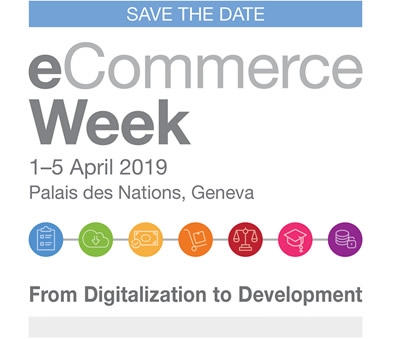International co-operation on consumer protection in cross-border e-commerce
3 Apr 2019 11:30h - 13:00h
Event report
[Read more session reports and live updates from the UNCTAD E-commerce Week]
The session ‘International co-operation on consumer protection in cross-border e-commerce’ took place on 3 April 2019 in Geneva, Switzerland, during the UN Conference on Trade and Development’s (UNCTAD) e-commerce week, where experts discussed consumer protection regarding e-commerce.
Moderator Ms Ebru Gökçe Dessemond (Legal Officer, Competition and Consumer Policies Branch, UNCTAD) began the discussion by asking Ms Helena Leurent (Director, General Consumers International) what challenges consumers face with cross-border buying. Leurent named several challenges, including that a large part of the world does not have access to the Internet and that those that do, in the developing countries, sometimes have no access to quality Internet or payment options. Then there are the challenges that others face such as online shopping scams, fake reviews, and drip pricing. On the more extreme side, there is payment fraud which consumer protection agencies have taken action against, and as a result, many online consumers feel unsafe. E-commerce opens a world of convenience and options for consumers, and she is optimistic to work with stakeholders to create a safe environment. Ms Akira Yoshida (Analyst, Economic Cooperation and Development) presented findings from her research on challenges of cross-border enforcement cooperation, which include inadequate resources, lack of legal power, privacy and data protection, and incompatibility of legal regimes. After reviewing these findings, Yoshida suggested that governments should think about strengthening their consumer agencies. Ms Ying Yu (Research Fellow, University of Oxford) briefly spoke about the Chinese experience in e-commerce. She stated that China is a large contributor to e-commerce since the Chinese people, like everyone else, are more interested in purchasing items abroad, mainly from their US and EU trading partners. As a result of this cross-border commerce, certain consumer complaints are common, such as the cancelation of transactions without consent, delayed shipments, and fake products and tariffs.
Mr Andrea Minuto Rizzo (Head, International Affairs Unit Italian Competition Authority) focused on consumer protection cooperation (CPC). The new CPC extends the scope of application, strengthens minimum powers of national authorities in cross-border situations, and increases vigilance through a new EU wide market alert system. Moving on to more practical aspects, the CPC network’s 2016 sweep focused on misleading travel booking websites and asked the website owners to bring their practices in line with EU consumer legislation. There have been several other initiatives by the CPC to provide consumer protection such as allowing national competent authorities to co-ordinate their approaches by applying consumer protection laws. Ms Cecilia Parker Aranha (Project Director, Competition and Markets Authority) talked about the need for a cross-border enforcement toolkit. This could provide the power to share and request information with other enforcers, as well as effective cross-border investigatory powers, remedies, and sanctions. Aranha also included behavioural economics, meaning we should be protecting the consumers from themselves. There is deceit and lack of transparency in the exchange of goods and services on the international level that puts consumers at risk because of misinformation or lack of information. This was a nice segue to the next panellist, Ms Maria Carolina Corcione (Deputy Superintendent for Consumer Protection Superintendence for Industry and Commerce, Colombia). She was not present, so a video was presented to share thoughts on e-commerce and product safety. As a consumer protection agency, they face many problems like online shopping via social media, influencers for social advertising like a liability – the main concern is product safety which can cause damages to consumers. To enhance safety, Corcione suggests an open dialogue and avoiding double standards in different countries, as, for example, with recalls. An item may be recalled in one country, but then sellers sell it to another country where it is allowed because they do not have the same regulations for informing other countries on regulations. This danger to importing countries can be avoided. Finally, she suggested that to have a comprehensive consumer safety policy, first they must educate consumers.
By Jainee Feliz-Cabrera
Related topics
Related event

eCommerce Week 2019: From Digitalization to Development
1 Apr 2019 15:45h - 5 Apr 2019 15:45h
Geneva, Switzerland
